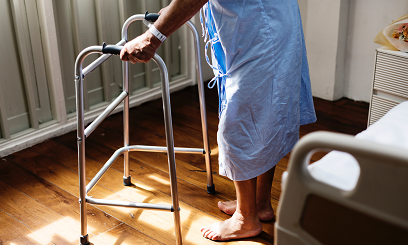Identifying and addressing unwarranted clinical variation in hip fracture care
Identifying and addressing unwarranted clinical variation in hip fracture care to improve health outcomes

Project Members - Macquarie University
Rebecca Mitchell - Associate Professor E: r.mitchell@mq.edu.au
Project Main Description
Hip fracture is the most serious and costly fall-related injury suffered by older people. It is expected that by 2022, there will be more than 30,000 hip fractures among Australians per year, at an estimated cost of $1.13 billion. Delivery of evidence-based care for hip fracture patients can reduce mortality and morbidity, improve function, reduce the need for residential aged care and reduce risk of further fractures.
However, there is mounting evidence of variation in the quality and safety of health care, including hip fracture care, across jurisdictions and hospitals in Australia. Whilst variation is not necessarily bad, unwarranted clinical variation is variation that can only be explained by differences in health system performance. Identifying and addressing unwarranted clinical variation results in measurable improvements in health outcomes through reduced complications, reduced hospital length of stay, reduced readmissions and reduced mortality.
Australia has an NHMRC endorsed Hip Fracture Guideline, a national Clinical Care Standard for Hip Fracture Care and a clinical-quality Registry aimed at optimising management of hip fracture. Evidence from the United Kingdom estimates that 1,000 lives were saved over a five-year period following the introduction of a similar coordinated Guideline/Standard/Registry approach to hip fracture care. There is a need to evaluate whether the Australian initiative has achieved similar outcomes, and to identify areas where improvements can be achieved.
This innovative national data-linkage project will identify unwarranted clinical variation, and for the first time, put a price on the observed variation. The close links between this research team and key national organisations with leadership roles in this area will maximise the impact of the results by rapid review and dissemination through existing channels to all health jurisdictions, local hospital networks and clinical bodies.
Publications
Check back soon.
Project Sponsors
National Health and Medical Research Council
Agency for Clinical Innovation
Collaborators
- Jacqueline Close, Orthogeriatrician at Prince of Wales Hospital and Clinical Director of the Falls, Balance and Injury Research Centre at Neuroscience Research Australia
- Lara Harvey, Senior Postdoctoral Fellow at NeuRA and Conjoint Lecturer, School of Public Health and Community Medicine
- Ian A. Harris, orthopaedic surgeon and Professor of Orthopaedic Surgery at the South Western Sydney Clinical School, UNSW
- Hannah Seymour, Orthogeriatrician, Fiona Stanley Hospital, Western Australia
- Ian Cameron, Professor geriatric medicine, University of Sydney
- Kenny Lawson, Principal health economist, University of Western Australia
- Louisa Jorm, Foundation Director, Centre for Big Data Research in Health, UNSW
Related Projects
Related stream of research
Patient safety and appropriateness of care
Project Status
Current
Centres Related to this Project
Content owner: Australian Institute of Health Innovation Last updated: 11 Mar 2024 6:03pm
